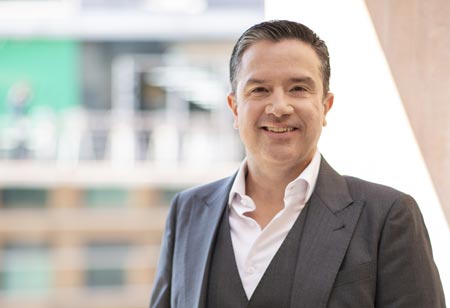Javier Carnevali is the Chief Procurement Officer at Grupo Herdez, where he leads a team of over 70 professionals managing the complete source-to-pay process across raw materials, packaging, co-packers, CAPEX, indirect spend, and services. His journey in sourcing and procurement began in 2005 at a strategic sourcing consulting firm in Caracas, Venezuela, where he helped clients achieve cost savings through a high-stakes “no savings, no fee” model. He later transferred to the firm’s Mexico office before joining Grupo Herdez as Deputy Director during a pivotal transformation of the company’s supply chain. Within two years, he was promoted to head both Strategic Sourcing and Procurement, ultimately shaping and leading a valuedriven, innovation-focused procurement function within one of Mexico’s leading food companies.
Overcoming Supply Chain Disruptions and Building Resilient Supplier Relationships
The past few years have provided invaluable lessons in managing unforeseen disruptions—from geopolitical tensions and trade wars to natural disasters and, of course, the pandemic. Early on, we established a clear purpose: “adding value to the business through sustainable relationships.” This guiding principle drives us to increase efficiency, reduce risk and environmental impact, enhance profitability, develop people, and accelerate innovation.
At the core of this strategy is relationship-building. Developing strong partnerships with suppliers proved essential in managing market volatility and ensuring business continuity. We began by conducting risk analyses for each strategic category, identifying key suppliers that required a more tailored, collaborative approach. Instead of focusing solely on price, we engaged in value-based discussions—understanding suppliers’ needs, helping ease their operations, and working together to grow the pie rather than divide it. As a result, we maintained a supplier fill rate above 97 percent before, during, and after the pandemic.
Proven Strategies for Driving Cost Savings without Sacrificing Supplier Partnerships
To deliver sustainable savings without compromising service or quality, we adopted a comprehensive approach built on three key pillars:
Strategic Supplier Segmentation
Not all suppliers require the same management style. We developed a segmentation model to identify strategic partners and tailor our engagement accordingly. For these key relationships, we focus on long-term contracts to ensure stability, implement transparent, formula-based pricing to foster fairness and collaborate closely on innovation. We also align on sustainability goals and hold regular C-level meetings to reinforce trust and mutual accountability.
While savings may fluctuate year to year, our consistent use of market intelligence ensures we are always ready to capture new opportunities.
Rigorous Category Management
A disciplined approach to category management allows us to understand the market dynamics of every product or service we procure. While savings may fluctuate year to year, our consistent use of market intelligence ensures we are always ready to capture new opportunities.
Holistic Savings Identification Beyond Price
We look for value across the entire value chain—not just in price reductions. This includes streamlining administrative processes to lower internal costs, sharing data to optimize inventory and minimize waste, and improving working capital through favorable payment terms or inventory strategies. We also reduce consumption through demand management and create joint value by collaborating with suppliers on process improvements and technology integration.
These strategies have enabled us to achieve long-term cost efficiency while maintaining strong supplier partnerships and high service standards.
The Role of Technology in Modernizing Procurement
Technology is a powerful enabler in transforming procurement operations. At Grupo Herdez, we use best-in-class platforms to drive efficiency, transparency, and visibility across all core procurement activities—including strategic sourcing, procure-topay, contract management, and spend analysis.
This digital transformation has significantly improved our performance. We’ve reduced our purchase order cycle from 17 days to just 4.3 days, managed 100 percent of quotations electronically, generated real-time reports, and utilized AI electronically, generated real-time reports, and utilized AIpowered insights to support better decision-making.
Looking ahead, we plan to invest in technologies that strengthen supply risk management. These tools will allow us to move from reactive responses to proactive strategies by anticipating potential threats and disruptions before they occur.
Advice for Building a Successful Career in Food Industry Procurement
For professionals aspiring to build a solid foundation in procurement and supply chain, especially within the food industry, my advice is:
Focus on Relationships First, Then Transactions
Strong internal collaboration and supplier partnerships are key to achieving lasting results.
Own the Data
Thorough data analysis enables you to uncover insights and drive change with confidence. Solutions rooted in data are always more compelling than those based on assumptions.
Balance Process, Technology, and People
Any new initiative—be it a process, a platform, or a tool—must align with the maturity level of the organization. Even the best technology won’t succeed if your team isn’t trained or your process isn’t ready. Likewise, even the most capable team and well-designed process can’t reach full potential without the right digital tools.
To succeed in procurement today, I believe teams must develop and strengthen the following competencies
• Creative Thinking: Continuously seeking new ways to solve problems and improve outcomes.
• Analytical Thinking: Turning data into actionable insights.
• Technological Skills: Understanding how to leverage AI and digital platforms for performance gains.
• Strategic Influence: Combining negotiation, communication, and persuasion for impactful decision-making.
• Business Acumen: Recognizing how procurement choices affect financial performance.
• Empathy and Active Listening: Building trust-based relationships with internal and external stakeholders.



